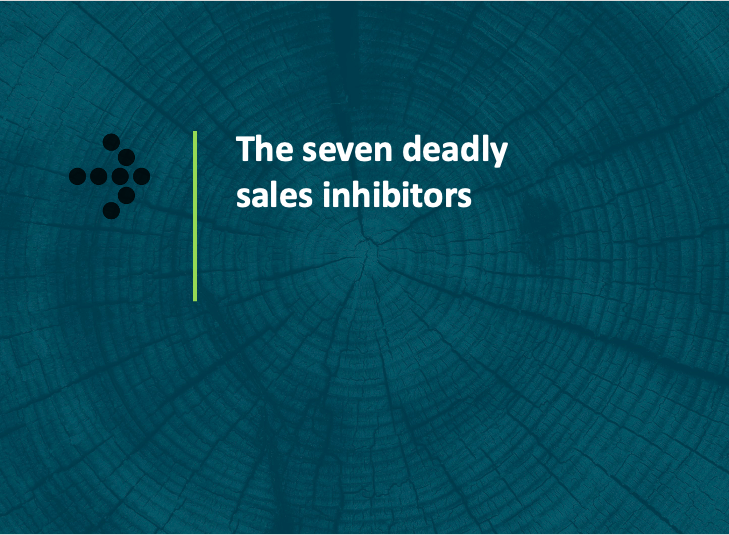The seven deadly sales inhibitors

Every employee in every organisations carries traits that either enhance or inhibit job performance. By measuring an employees enhancers and inhibitors and comparing the results with the requirements of a particular role, Evalex helps line managers to predict workplace behaviour. This, in turn, lessens the risk of surprises and guides a manager in staff selection, development and talent management.
The measurement of an individual’s performance inhibitors plays an important part in determining how well he or she will respond to the requirements of a specific job within an organisation. The significance of each inhibitor is influenced by the individual’s role of level of work. Some inhibitors are relatively inconsequential in a specific role, while others are deal breakers.
As an example, we examined the role of salesperson and picked the seven most deadly performance inhibitors. Where individuals exhibit these traits, we would most definitely not recommend them in a sales role:
- Low energy
Individuals with low energy are generally slower to act in relation to others. They tend not to take initiative, are slow off the mark, and do not put themselves under too much pressure. They prefer a more relaxed pace, tend to be less ambitious and are often not very driven.A sales person needs to be a self-starter. S/he needs to be “out there”, getting clients motivated to do deals and bringing in the numbers.
- Lack of focus
Often success is created by pure dogged determination. Individuals who are not focused tend to be less persistent, resilient or tenacious. They easily deviate from plans and are generally unfocused. They often start things but seldom have the discipline to follow through and complete them.A lack of focus in a sales person is a deadly inhibitor as the sales process requires applied concentration from start to finish.
- Wheel-spinning
Creativity and innovation are valuable assets for any organisation. However, if these creative thoughts are not implemented or executed, the organisation may not reap the benefits. This individual enjoys variety, change and innovation, but may lose interest when expected to execute and deliver on proposed initiatives.A sales person needs to focus on the end result – i.e. closing the deal, following up on delivery and issuing the invoice. Finding creative ways to sell is just the start.
- Resilience
In the modern world we are faced with countless struggles, barriers and setbacks. A sales person needs to be resilient in overcoming these. An individual who lacks the necessary emotional energy and tenacity to bounce back after set-backs, to start again and take on new challenges, will no be successful in a sales role.A salesperson has to be able to take no for an answer – but then bounce back and find new ways of reaching his or her goals.
- Dismissiveness
This inhibitor is often the product of a low EQ. Sales people must be sure to come across to others as being caring and interested. They must be relationship-driven, and have an innate understanding of the way others perceive them.Individuals with high IQ, but who lack emotional intelligence, tend to come across as being dismissive, almost as if their intelligence allows them to look down on others. While this may not be the intention, it can still be perceived. This is a deadly inhibitor for a sales person.
- Timidity
It almost goes without saying that timidity is a deal-breaker in a sales person.Timid people may not always have the courage to speak their minds. They generally will not assert their opinions, share or challenge others’ ideas or demonstrate their disagreement. They may find it difficult to say no and take a firm stance against opposing ideas and opinions.As a result they may be perceived as shy, not adding value or easy to take advantage of.
- Negative internalisation
A person who is prone to negative internalisation is generally more sensitive to criticism. On the face of it they will not admit that negative feedback actually gets to them, but they often internalise and take the feedback personally.A sales person must be able to take criticism and negative feedback on the chin. S/he must be able to bounce back and not let anything get him/her down.
This is just one example of how performance inhibitors can impact on a specific role. Over 36 years of research through talent assessment, Evalex has compiled a list of 44 performance inhibitors that impact on individuals’ ability to resolve problems, manage relationships, manage themselves and execute and deliver on their tasks and objectives.
Evalex measures performance inhibitors and enhancers as part of the Evalex20 battery of psychometric assessments, which also maps archetypes, styles, potential and leadership indicators, job fit and talent.